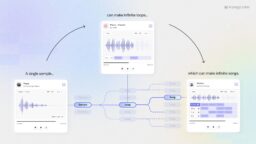LimeWire, the reborn former file-sharing platform now focused on artificial intelligence-powered content creation, has forayed into AI music creation with the introduction of its AI Music Studio.
LimeWire’s August launch of its LimeWire AI Studio, in partnership with Polygon Labs, paved the way for users to create AI-generated images. At the time, the company hinted at launching music and video capabilities later in the year.
Four months later, LimeWire has lifted the curtains on the LimeWire AI Music Studio, which will allow users to create “fully ownable AI-generated tracks.”
LimeWire says the development marks its “second significant investment” toward bolstering its AI offerings and follows its acquisition of AI image generator platform BlueWillow in September.
The company said that, similar to its acquisition of BlueWillow, the AI Music Studio integrates the existing AI Studio interface with advanced generative AI technology.
“The launch of LimeWire AI Music Studio represents a groundbreaking technological milestone, symbolizing not only a stride forward in our pursuit of innovation but a profound commitment to fostering creativity within the dynamic landscape of modern content creation,” said Paul Zehetmayr, co-CEO of LimeWire.
“As music continues to evolve, so does our dedication to providing aspiring musicians with cutting-edge tools that empower and amplify their artistic expression.”
Paul Zehetmayr, Limewire
“As music continues to evolve, so does our dedication to providing aspiring musicians with cutting-edge tools that empower and amplify their artistic expression.”
Through LimeWire AI Music Studio, users will be able to generate full-length tracks, create cover images for their work, and publish them all on a single platform. Additionally, it integrates open-source AI technologies, allowing users to maintain ownership of their created music, unlike competitors who solely provide creation capabilities without ownership rights or depend on Discord communities and intricate prompts, LimeWire said.
The company says it uses blockchain technology and its native platform currency token, LMWR, to make AI-generated content ownable and tradeable, allowing creators to monetize their content as part of the LimeWire ad-revenue share program. LimeWire says it hosts a community of over 2 million creators who have designed more than 500 million AI-generated content pieces.
The debut of LimeWire AI Music Studio accelerates the company’s comprehensive product development plan, as it aims to launch a fully-fledged AI-enabled audio workstation in 2024. LimeWire says it envisions a future where anyone can become a music artist, producing tracks from beats and melodies to lyrics and editable singing voices.
“Our platform is designed to break down barriers, allowing aspiring musicians and creators to unleash their potential with the power of AI.”
Julian Zehetmayr, Limewire
“Our platform is designed to break down barriers, allowing aspiring musicians and creators to unleash their potential with the power of AI. As we venture into the future of music, it is our firm belief that AI technology should be a catalyst for inclusivity, empowering aspiring musicians from all walks of life,” Zehetmayr said.
“By providing accessible AI tools, we aim to level the playing field, ensuring that traditional resource constraints no longer hinder the creative journey.”
LimeWire has formed strategic partnerships with Algorand, Polygon, Google Cloud and Universal Music Group, partnering with UMG artists to launch music-based NFT projects using the LimeWire marketplace.
In May, LimeWire announced that it had raised USD $17.5 million in multiple rounds of funding through the sale of LMWR tokens, exceeding its $15 million funding target and inching closer to its $30 million fundraising limit.
LimeWire began in 2000 as an illicit music file-sharing platform, before being sued by numerous rightsholders. It relaunched last year as an NFT marketplace, and launched a new subscription service for creators and brands, not just musicians, earlier this year.
Music Business Worldwide





